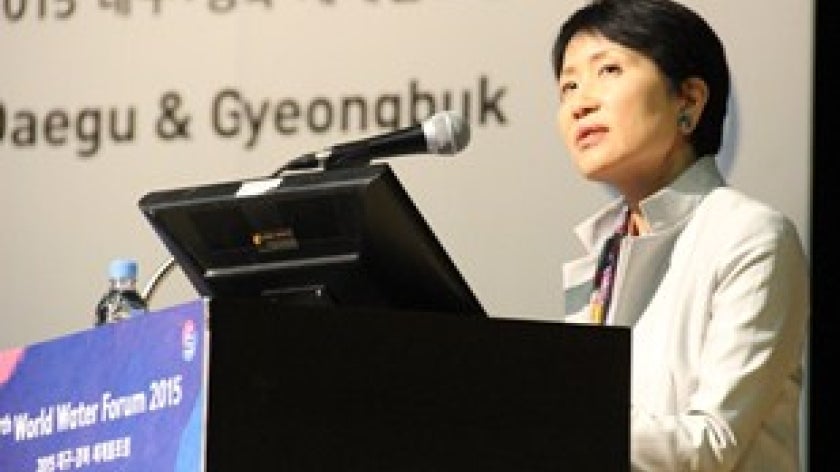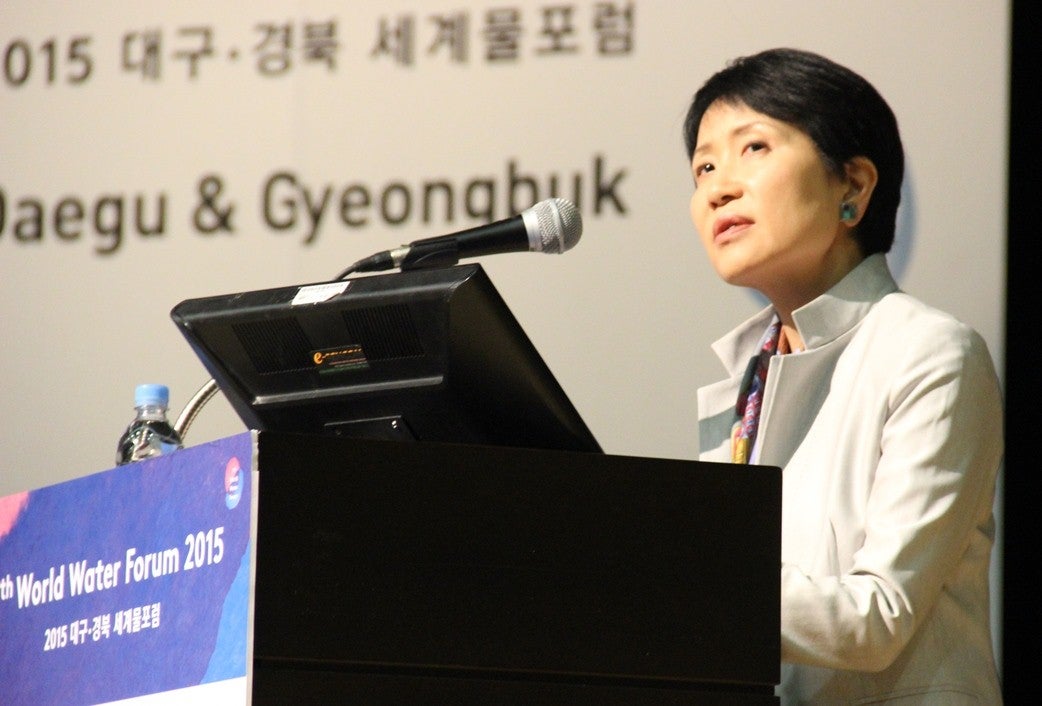

GEF CEO Naoko Ishii was invited to kick off this important Forum on Waters on Monday, April 13 in Daegu, South Korea and share her personal experience in the opening plenary on how the GEF has worked towards achieving change in areas where challenges might seem entrenched and unchangeable, and how to sustain the momentum towards real transformational change.
In her remarks on Monday, she stressed the need to look at 2015 as a pivotal year, not only for the water agenda, but many other path-setting events that will define the sustainability of earth’s ecosystem and human development. These are namely a framework for disaster risk reduction that was discussed in March in Sendai, Japan, the Financing for Development conference in Addis Ababa, Ethiopia in July; the Sustainable Development Goals summit in September in New York City and finally in December the Paris climate summit, where the world will come together to change course and agree on an accelerated path to address Climate Change if a world + 4 degree C is not to become our future.
Ishii doesn’t see this as a coincidence: “Rapid human development has been altering the key earth systems, be it the climate system, land use, water, forest and nutrient cycle. We are pushing the carrying capacity of those earth systems beyond their limit. We may have already transgressed tipping points, or, “safe planetary boundaries” of some of these systems, beyond which abrupt changes could not be ruled out”.
“Pressure on the earth system, and in turn on sustainable development, will only increase going forward, with the world population growing to 9 billion by 2050, a middle class expected to reach 3 billion, and continued \ rapid urbanization. It is therefore important that we stay within the planetary boundaries, while pursuing prosperity. We need to find a way to consume, produce, and live, that will not undermine the health of the earth eco system, which is the foundation for sustainable development.” Naoko Ishii said.
In her very personal remarks she looked back to the creation of GEF’s 2020 strategy and the challenges associated with it, given the fact that the world faces three mega trends and a new way to do business is needed to avoid putting social, societal and economic development at risk, both locally and globally.
“GEF2020 is searching for the answer to this question. It proposed an integrated approach across earth systems to the systemic, holistic interwoven problems of the earth system. We believe this is much more effective. It proposed a driver focused approach, rather than addressing symptoms. It proposed multi-stakeholder platform approach as key issues require diverse stakeholders to be
Water, as a key earth system under planetary boundary framework, is central to the challenge as an interconnected sector, to the importance of thinking holistically and to an integrated approach, and its potential to provide effective solution to sustainability. I am very pleased that the focus of this Forum is implementation and the goal is to come up with effective solution mechanisms.
The water sector has produced a number of promising lessons for implementation. In particular the international waters sector, namely, ocean and international rivers, lakes and aquifers are spearheading the effort to find effective mechanism for solutions. Precisely because they are forced to work together due to the transboundary nature of the subject.
Solution mechanisms / action tools
Ishii then shared with the audience what she sees as key to effective delivery and solution mechanisms:
“First, we need to bridge the gap between science and policy. The scientists need to inform the questions that policymakers have and need to answer in clear and understandable language that speaks to policy makers. They need to point to opportunities and solutions, not only the problems.
Secondly, there is a need for multi-stakeholder platforms. One process the GEF successfully has funded in the International Waters sector is common fact finding and dialogue between government, academia, civil society and the private sector. Such common fact finding is essential to get from perceived threats to agreed facts, and provide a basis to agree on a shared vision and investment plans.
Third, the role of finance. To tackle the multitude and scale of issues the earth faces today, we need to form strong partnerships with the private sector. Public funds can play an essential role in incentivizing needed actions, and take risks to help private sector promote new technologies, innovation and path-breaking approaches. I am proud to say that I have seen many innovative business models in our portfolio.
Fourth, vulnerability and resilience. The natural water cycle provides buffers and reduces vulnerability while improving ecosystem resilience to water-related disasters. Two examples of it being neglected despite of its potentials are:
The functioning of wetlands as a buffer in scenarios of too little or too much water. They provide services to support community livelihoods, food security, protect infrastructure and for their capacity to sequester carbon.
Groundwater – while it plays an essential role in poverty alleviation and is a buffer to climate variability, its governance and management lags far behind that of the management of ‘visible water’. Sound groundwater governance is essential to keep seeing rivers flow, fields bloom, societies prosper and healthy people benefitting from it all.
Fifth, freshwater needs to be governed in a participatory way that draws on the full potential of women and men as professionals and citizens, both as users as managers. I stress this issue today, not as a woman, but as practitioner who has been working for development and environment and witnessed if we empower women we get bigger benefits.
Finally, sustainable water management today and in the future is inspired by what we have done in the past. Yet, in a time of climate change, the past is no longer a reliable predictor of the future. We are required to be more innovative, to abandon sectorial silos and learn to produce more with less.
I am always telling my staff and myself, we want to be a champion towards identifying and implementing solutions; solutions that will bring transformational change to the way we manage our ecosystems and resources so that we leave a healthy planet for future generations.
I want to remind us all of what Mahatma Gandhi said. “The future depends on what we do in the present.”